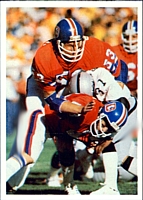The Orange Crush Defense was the 3–4 defense of the Denver Broncos during the late 1970s and early 1980s. The National Football League (NFL) team adopted the 3–4 defense during the 1976 season, and the nickname "Orange Crush" for the team's defense was popularized early in the 1977 season by sportswriter/broadcaster Woody Paige.[1][2]

in the 1977 AFC Championship Game
It was one of the top defenses of its time with linebackers Tom Jackson and Hall of Famer Randy Gradishar.[3] Other key players were defensive linemen Paul Smith (a two-time Pro Bowl selection), Barney Chavous, Lyle Alzado, and Rubin Carter, linebackers Bob Swenson and Joe Rizzo, and defensive backs Billy Thompson, Louis Wright, Steve Foley, and Bernard Jackson.
In early 1977, head coach John Ralston stepped down after his best season and New England offensive line coach Red Miller was brought in to guide an already talented team to their first playoff berth.[4][5][6] The defense was already showing signs of dominance. By Week 7 of the 1977 season, the Broncos were 6–0 and the defense was well known as “The Orange Crush Defense,” giving up a total of 46 points during those games.
The defense was led by coordinator Joe Collier, defensive line coach Stan Jones (inducted into the Pro Football Hall of Fame in 1991), and first-year head coach Red Miller. Denver was 12–2 in the regular season, made its first post-season appearance,[7] and advanced to Super Bowl XII in New Orleans after home playoff wins over Pittsburgh and Oakland, winners of the previous three Super Bowls.[7][8] The 1977 Broncos had the NFL's number-one defense against the rush and were a respectable 11th (of 28 teams) against the pass using the NFL Passer Rating. The third fewest in the league, they only let up 10.6 points per game.
The team's defensive unit derived their nickname from their orange home jerseys and a popular soft drink, Orange Crush.[9] This delighted the makers of the soft drink, based in Illinois near Chicago.[10] They were also known for their casual attitude toward the NFL rulebook, particularly making use of illegal-but-rarely-called chop blocks.
The use of the term has resurfaced in recent years, most notably in reference to the Broncos' 2015 season.[11]
References
edit- ^ Niesen, Joan (September 22, 2014). "THAT OLD ORANGE MAGIC". Sports Illustrated. Retrieved November 6, 2016.
Throughout that season Rocky Mountain News sportswriter Woody Paige had helped popularize a nickname for the Broncos' defense: Orange Crush.
- ^ Engelbart, Drew (October 4, 2015). "Legendary 'Orange Crush' members talk as Broncos team echoes their success". KDVR. Retrieved November 6, 2016.
- ^ "Randy Gradishar elected to Pro Football Hall of Fame's Class of 2024". www.denverbroncos.com. Retrieved February 9, 2024.
- ^ Mossman, John (February 1, 1977). "Ralston quits Broncs, Miller seen stepping in". The Day. (New London, Connecticut). Associated Press. p. 18.
- ^ "Ralston walks out on Broncos". Pittsburgh Post-Gazette. Associated Press. February 1, 1977. p. 13.
- ^ "Following best year, Ralston quits Denver". Spokesman-Review. (Spokane, Washington). Associated Press. February 1, 1977. p. 17.
- ^ a b Marshall, Joe (January 2, 1978). "That Crushmas spirit". Sports Illustrated. p. 14.
- ^ Jenkins, Dan (January 9, 1978). "Wholly Moses for Denver". Sports Illustrated. p. 14.
- ^ Groke, Nick (January 11, 2015). "Broncos' 1977 Orange Crush defense honored at half of Colts playoff". The Denver Post. Retrieved November 6, 2016.
- ^ "Broncos 'pay off' Crush". Spokesman-Review. (Spokane, Washington). January 15, 1978. p. D1.
- ^ Paige, Woody (January 24, 2016). "Paige: These Broncos may surpass the Orange Crush". The Denver Post. Retrieved November 6, 2016.